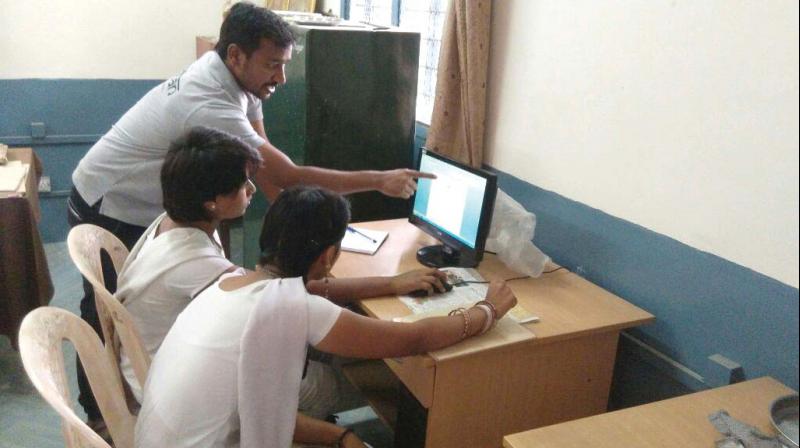NGO gives govt school kids shikshan' in comps, English

Bengaluru: Vinod was educated in private institutions his entire life. His friends and he would go to the government school, opposite their own, during the lunch break to munch on free groundnuts distributed to children. He recalls how crowded the government schools were back then, in comparison to his own and was taken aback to see a complete reversal in strength now.
Earlier this April, Vinod and three of his friends decided to personally assess a few government schools to see what was lacking and how they could help.
“A seventh standard student could not write his name in English. All high school students were scared of computers. Some of them were even worried that something could go wrong if they ever operated it,” Vinod said, adding that on deeper analysis, they understood the root cause.
“Most of the teachers in public schools only taught and interact in Kannada. This put the children at a great disadvantage, given that private schools equipped kids with English and technology skills,” he explained.
Thus was Shikshan born, with the sole intention of providing English and computer education to government school students, so that they can enjoy a level playing field and be competent in the future.
They began their service at Sampangiramnagar Government School from June and later included two other institutions. The Shikshan team of four divided the classes into three categories, grades 1-4, 5-7 and 8-9. Primary schoolchildren are taught shapes, curved and straight lines, alphabets and phonetics.
With an excitement in his tone, Vinod describes their method. “Middle schoolchildren learnt grammar through games and the results were wonderful. For example, we made the class stand in a circle. If a sentence was in the present tense, they would jump at the same spot. If it was future tense, they jumped forward and for past, they jumped a step back.”
Such creative methods were used to teach children about adverbs, adjectives, nouns and other building blocks of English language, he said.
The high school students were introduced to computers. From what Shikshan observed, many students dropped out after 10th standard because of financial constraints or because they could not pass the board exams.
“With basic computer skills, they can go on to learn other advanced computer courses in the future. They can become independent working adults,” Vinod insisted.
But there was an obstacle, as none of the schools had computers. The friends pooled in their personal resources and bought three computers for students of CV Raman Nagar Government School. Two days ago, seven computers were donated by the CSR wing of Techno Tree Company located in Bagmane Tech Park.
When a teacher asked Vinod if he would put his child in a government school, his first thought was that the ambience and appearance of the space was discouraging, with the bare minimum of the old Sarva Siksha Abhiyaan.
“Private Montessori centres have cartoons like Mickey Mouse and Chota Bheem. A major advantage that government schools have is the land. To improve the environment, we conducted a tree plantation drive at Wilson Garden, Rajajinagar and Shantinagar schools. We divided students into groups and asked them to plant a seed and nurture it. After three months, the team with the healthiest plant will receive a prize. The incentives naturally got the children excited and they have planted fruit and flower seeds,” he said.
Shikshan also began conducting personality development courses once a week, in five schools. Facebook turned out to be their biggest ally, bringing in volunteers from as far as Kengeri, Thalagattapura and Davangere.
“The effort must spread and any citizen should be able to undertake Shikshan activities and pass on the ideas to others. With customised material in hand, we train volunteers on how to teach English and computer courses. Block educations officers are also roped in to facilitate public involvement,” Vinod said.
He has a double degree in B.Com and B.Tech and is now a scientist at DRDO. With the help of his colleagues and fellow scientists he is planning to conduct computer classes for children from next week.
The initiative that started with him, Gopi Krishna, Roopa and Satish, has now expanded to 15 members.
Asked whether their efforts have yielded results, he said, “The students have begun talking in English. Teenagers can create resumes, write leave letters and make Power Point presentations on computers. They include these in their Practical Record books, something that we recently introduced them to,” Vinod said.

